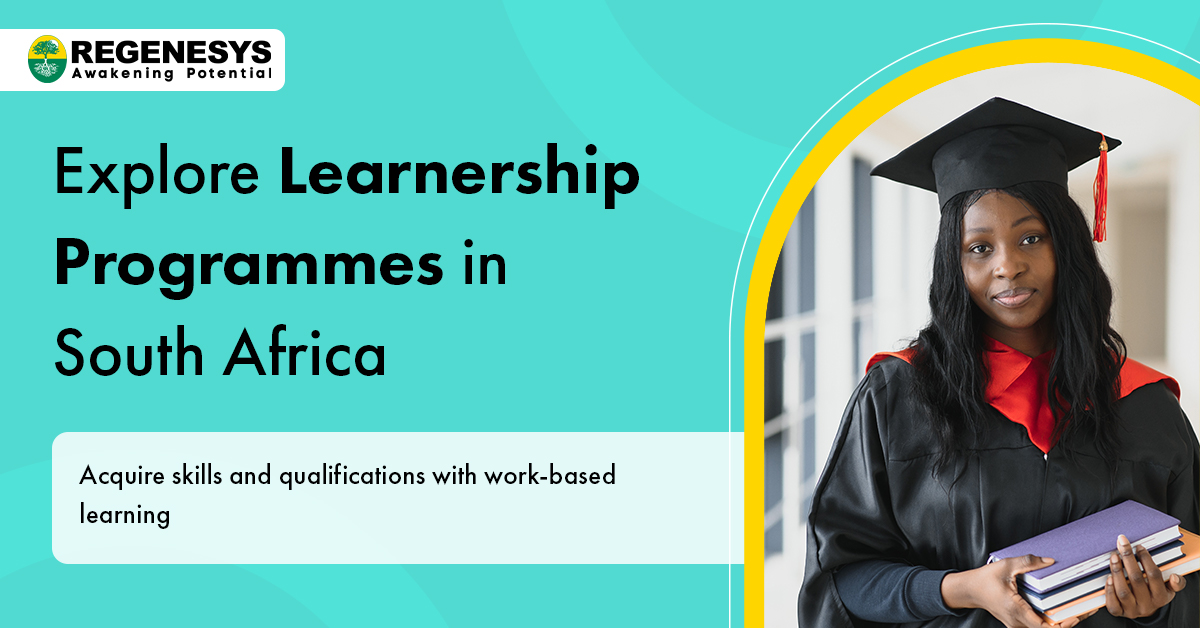Learnership programmes are work-based learning programmes that combine theoretical classroom learning with practical work experience, leading to a National Qualifications Framework (NQF)- registered qualification. These programmes are introduced in South Africa to address the country’s skills gap by offering targeted training in various industries.
As a result, participating in this programme can help you gain the necessary skills and workplace experience to open up better employment or self-employment prospects. However, you might have asked this question before, such as, ‘What is a learnership?’ or ‘How does learnership benefit my career?’. In this article, we will help you understand more about learnership, its benefits, key requirements, application procedures and key tips you can follow for successful application. So, continue reading for more insights!
Table of Contents
What is a Learnership? Understanding Learnerships in South Africa
As mentioned before, learnership is a training programme that offers a way to gain work experience and an NQF-registered qualification. It includes classroom-based learning at a training centre or on-the-job training in a workplace, helping you gain advanced skills and preparing you for better employment opportunities.
Learnership programmes were formally introduced under the Skills Development Act of 1998 in South Africa to help prepare learners for the workplace. Today, all learnership programmes are managed by Sector Education and Training Authorities (SETAs), addressing the challenges of:
- Decreasing employment rates
- Unequal access to education, training, and job opportunities
- The impact of race, gender, and geographical location on educational progress
- Addressing skills shortages across various sectors.

Learnerships 2024: An Overview
Learnership programmes have been crucial in South Africa’s efforts to develop its workforce. These structured programmes offer opportunities for skill development and career advancement by aligning education with industry demands. Today, numerous learnership programmes are available to drive skills development and employment opportunities across diverse sectors.
Hence, to those who ask, ‘What is a learnership?’, you know what learnship is. Now, you will find the top available learnership in 2024. Here, we have highlighted the industry-specific learnership programmes and top companies offering them.
- Available Learnerships for 2024:
With numerous learnership programmes available in South Africa, applying for the right programme can offer many benefits, including professional growth and employment opportunities. Given below are some of the availablelearnership programmesin South Africa:
- Citi South Africa Learnership:
Citi South Africa Learnership is a one-year-long learnership programme that offers practical working experiences to newly qualified graduates across Citi businesses. Besides, this programme trains graduates to grow in today’s changing economic environment and make an impact on the African economy.
- Santam Short-Term Insurance Learnership:
The Santam Learnership Programme is a 12-month programme that aims to develop a skilled workforce in the financial services sector. It offers a qualification and includes Financial Sector Conduct Authority (FSCA) regulatory exams RE5.
- RSAWEB Learnership:
RSAWEB Learnershipprepares individuals to fulfil roles in the Network Operations sector of the telecommunications industry. This learnership programme is ideal for those who are starting their career in the telecommunication industry. This learnership programme will help learners gain experience handling TCP/IP network operations, installing and maintaining customer equipment, and more.
- Dis-Chem Dispensary Support Learnership:
The learnership programme aims to give participants a thorough understanding of pharmacy operations, including customer service, stock management, and medication dispensing. As a result, aspiring pharmacists will gain valuable experience and training in the pharmacy industry through this programme.
- Industry-Specific Learnership Programmes
Industry-specific learnership programmes offer specialised training to meet the distinct needs of different sectors. They focus on providing participants with essential skills and hands-on experience needed to excel in key industries such as healthcare, finance, technology, and manufacturing. So, here are the top learnership programmes for different industries:
- Healthcare Learnership Programmes:
These programmes equip participants with specialised training in patient care, medical administration, and clinical support. As a result, it prepares them for careers in healthcare and helps them become valuable contributors to healthcare delivery. The following are the top healthcare learnership programmes:
- Health and Welfare Sector Education and Training Authority (HWSETA) Learnership
- Anova Health Institute Learnership
- Information Technology Learnership Programmes:
These learnership programmes focus on software development, network management, and cybersecurity skills, preparing participants for roles in tech-driven environments.
- Dynamic DNA IT Learnership Programme
- Data Science & Robotic Process Automation Learnership
- Business and Management Learnership Programmes:
This learnership programme equips participants with business skills in administration, project management, and customer relations. As a result, the learners can enhance their ability to contribute to organisational success and leadership roles.
- Finance and Accounting Services (FASSET) SETA Learnership
- Robert Bosch Administration Learnership
- Engineering and Manufacturing Learnership Programmes:
These learnership programmes cover areas such as mechanical engineering, industrial automation, and quality control in the engineering and manufacturing sectors. This specific learnership ensures learners have the technical skills necessary for roles in production and engineering fields.
- Manufacturing, Engineering and Related Services (merSETA) SETA Learnership
- ArcelorMittal South Africa
- Key Companies Offering Learnership Programmes
Since we have discussed the top available and industry-specific learnership programmes, let’s check out the leading companies offering learnership programmes in South Africa in 2024. So, here are the major corporate offering learnerships:
- Liberty Group
- ABSA
- FirstRand
- Busamed Private Hospital
- Gijima
- Hyundai
Benefits of Learnership Programmes
As learnership programmes provide a blend of theoretical knowledge and practical experience, they are a gateway for professionals to succeed. It offers numerous advantages for both participants and employers. When individuals participate in a learnership, their qualifications become more credible. On the other hand, employers can be confident that these individuals possess theoretical and practical knowledge to do their work effectively by tackling real-world business challenges and contributing to the organisation’s success. Here are some key benefits of learnership programmes:
- Gain practical skills and knowledge directly relevant to the industry.
- Earn nationally recognised qualifications upon completion.
- Acquire hands-on experience in a real workplace setting.
- Get motivated and aim to add value to the business.
- Increase your chances of securing employment or advancing in your career.
- Receive a stipend or salary during the learnership period.
- Tend to work more independently, require less supervision, and have improved problem-solving abilities.
- Build professional relationships with industry experts and potential employers.
- Get mentorship and support throughout the programme.
What are the Key Learnership Requirements?
You must meet certain requirements when applying for a learnership programme. These requirements may differ for different learnership programmes. However, here we have listed the general criteria you must fulfil while participating in the programme and looking for answers to ‘What is a learnership?’:
- You must be a South African citizen with a valid ID document
- You must be older than 16 and younger than 35.
- Must have completed school, college or learning at other training institutions or studying part-time
- Have a National Senior Certificate (Matric)
- Must meet any subject or skill requirements like computer literacy
Matriculants and graduates can apply for entry-level learnership programmes to gain workplace experience and a formal qualification. Unemployed and employed South Africans can also participate in a learnership programme. However, if you are unemployed, ensure you have an employer prepared to provide the required work experience.
Some learnership programmes may have additional criteria or be designed for specific groups, such as youth, women, or individuals with disabilities. You can check the learnership provider’s website or contact them directly to get full details on the specific requirements. Hence, as you go through these requirements, we hope you have gained the answer to the question ‘Who Qualifies for Learnership?
How to Apply for a Learnership?
Each learnership programme has different application procedures. Yet, applying for a learnership involves several steps to ensure you meet the programme’s requirements and successfully secure a position. Here is a step-by-step guide for you to follow while applying for a learnership:
Step 1: Research and Choose Suitable Learnership Programmes:
The first step is to check various platforms like company websites, job portals, and government resources for available programmes. You can also look through the Department of Labour website to find a list of top learnership
Step 2: Check Eligibility Criteria:
The next step is to ensure you meet the criteria, such as age, educational background, and any specific demographic requirements set by the learnership programme of your choice.
Step 3: Collect the Necessary Documents:
After checking the eligibility criteria, you must gather the necessary documents, including:
- CV
- Certified copies of your ID
- Educational certificates
- A cover letter highlighting your interest in and suitability for the learnership.
Step 4: Apply For Learnership:
You can visit the specific learnership provider’s website and fill out the application form. However, double-check that you are providing accurate and correct information while completing the application form.
Step 5: Get an Employment Contract and Learnership Agreement:
Once accepted for the learnership, you must sign two legal documents: Learnership Agreement and Employment contract. The learnership agreement outlines your rights and responsibilities as well as those of your employer and education provider. On the other hand, an employment contract is to be signed by you and the employer, and it is only valid for the time period of the Learnership.
Tips for a Successful Learnership Application:
As you apply for learnership programmes, it is essential to follow a strategic approach to increase your chances of success. Below are the tips you can follow for learnership applications:
- Follow employer companies, training organisations, and recruiters on LinkedIn.
- Check hashtags like #learnerships, #internships, #apprenticeships, and #training on social media.
- Scan and prepare copies of certificates, accomplishments, and identity documents.
- Write a current generic CV using a modern structure.
Conclusion
Learnership programmes in South Africa blend classroom learning with practical experience to fill skill gaps and boost job prospects. Managed by SETAs, these programmes span sectors like healthcare, technology, and finance, offering accredited qualifications and hands-on training for learners. Therefore, you need to know the learnership programmes and their benefits to help you choose your career paths wisely. Moreover, understanding the application process will assist you in meeting the eligibility criteria and organising the required documents, which will greatly enhance your opportunities. By following the article, we hope you have gained the right answer to the question, ‘What is a learnership?’
FAQs: What is a Learnership? Essential Details for Aspiring Professionals
How do learnership programmes benefit my career?
Learnership provides practical skills and workplace experience relevant to your chosen industry, enhancing your employability and career prospects.
How can I find learnership opportunities?
You can find learnership opportunities by checking company websites, job portals, social media platforms (like LinkedIn), and government resources.
Can unemployed individuals apply for learnership programmes?
Yes, unemployed individuals can apply for learnership programmes. Unemployed applicants must ensure they have an employer willing to provide the required work experience during the learnership period.
What are the benefits of participating in a learnership?
Learnership meaning lies in its benefits, which include allowing you to gain practical skills, earn a stipend or salary during the programme, build professional networks, and receive mentorship and support.
Are learnership programmes only for young people?
No, learnership programmes are open to individuals of various ages, provided they meet the eligibility criteria set by the specific programme. Some learnership programmes may target specific demographics, such as youth, women, or people with disabilities.







